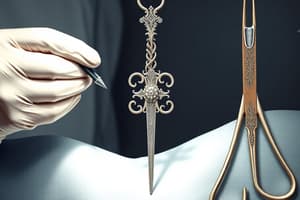Podcast
Questions and Answers
What is the category of the Adson forceps described in the text?
What is the category of the Adson forceps described in the text?
- Measuring and Gauging
- Cutting and Dissecting
- Grasping and Holding (correct)
- Suturing and Stapling
Which feature differentiates Adson forceps from other similar instruments?
Which feature differentiates Adson forceps from other similar instruments?
- Smooth jaws
- Flat thumb grasp area
- Fine tooth tips (correct)
- Serrated edges
What is the primary use of Ewald forceps as mentioned in the text?
What is the primary use of Ewald forceps as mentioned in the text?
- Grasping fine tissue
- Holding surgical drapes (correct)
- Hemostasis procedures
- Suturing blood vessels
What is the distinguishing feature of Debakey Forceps described in the text?
What is the distinguishing feature of Debakey Forceps described in the text?
Which instrument is recommended for aligning the edges of a wound during skin stapling?
Which instrument is recommended for aligning the edges of a wound during skin stapling?
What is the primary purpose of Debakey Forceps in surgical procedures?
What is the primary purpose of Debakey Forceps in surgical procedures?
Which forceps have a wide flat thumb grasp area that is horizontally serrated?
Which forceps have a wide flat thumb grasp area that is horizontally serrated?
Flashcards
Adson Forceps Category
Adson Forceps Category
Used for grasping and holding.
Adson Forceps Feature
Adson Forceps Feature
Distinctive fine tooth tips.
Ewald Forceps Use
Ewald Forceps Use
Holding surgical drapes.
Debakey Forceps Feature
Debakey Forceps Feature
Signup and view all the flashcards
Wound Alignment Tool
Wound Alignment Tool
Signup and view all the flashcards
Debakey Forceps Purpose
Debakey Forceps Purpose
Signup and view all the flashcards
Adson Forceps Shape
Adson Forceps Shape
Signup and view all the flashcards
Study Notes
Cutting and Dissecting Instruments
- Mayo scissors are straight or curved, come in various lengths, and have blunt tips.
- They are used for cutting tissue and require regular sharpening and screw tightening to prevent wear.
Tungsten Carbide Operating Scissors
- These scissors are available in straight or curved shapes and multiple lengths.
- They have gold handles and stay sharp for a longer period than standard instruments.
- They are available in three tip configurations: sharp/sharp, sharp/blunt, and blunt/blunt.
Dissecting Scissors
- These scissors are used for dissecting and cutting tissue only.
- They are available in various lengths and have blunt or sharp tips.
Extra Delicate (XD) Scissors
- These scissors are lighter and more delicate than standard instruments.
- They allow for precise control with minimal fatigue.
- They are not recommended for cutting sutures, drains, or heavy tissue.
Surgical Scissors
- These scissors are used for general, multipurpose cutting and dissecting.
- They are available in various lengths and have blunt or sharp tips.
Grasping and Holding Instruments
- Allis forceps are used to lift, hold, and retract slippery or dense tissue.
- They are available in various lengths and have finger ring ratchets with interlocking teeth.
- The tip style varies to meet the needs of the procedure or surgeon's preferences.
Eye Suture Scissors
- These scissors are originally designed for ophthalmic procedures but are now used in various surgical procedures.
- They are ideal for detailed dissection of fine tissue and fine suture removal.
- They should be handled with care to prevent dulling.
Towel Clip
- The towel clip is used for grasping tissue, securing towels or drapes, and holding or reducing small bone fractures.
- It has perforating tine-like jaws, locking ratchets, and sharp, curved tips of varying lengths.
Studying That Suits You
Use AI to generate personalized quizzes and flashcards to suit your learning preferences.




